| Article Overview:
Japanese soldiers are heading to Iraq. There has not been a
Japanese soldier killed in combat since the end of World War II, but
that may quickly change. The Japanese government offers
the family of any Japanese soldier $926,000 in death benefits should
they die in Iraq. America offers its fallen military a death
benefit of $6,000, of which $3,000 is taxable. Should
Americans killed in Iraq and other combat areas be given a higher
death benefit than $6,000, or should we keep our Spartan attitude and
let our troops "die for the cause" and not for the "money?"
Find out the facts and form your own opinion. |
 VigilanceVoice VigilanceVoice

www.VigilanceVoice.com
Wednesday--November
19, 2003—Ground Zero Plus 798
___________________________________________________________
Japan Sends Troops To Iraq: Puts $1
Million Bounty On Each Who Dies There
___________________________________________________________
by
Cliff McKenzie
Editor, New York City Combat Correspondent News
|
GROUND ZER0, New York, N.Y.--Nov. 19, 2003--
The price of death in Iraq has been put at nearly $1,000,000 for each
Japanese soldier who dies there. The "price of life" has
been nearly doubled by the Japanese government as it prepares to send
more than 1,000 Japanese troops to the war-torn country.
 |
|
Japan has a
long history of combat likened to that of the Roman Empire |
Japan currently pays
the families of its servicemen killed while on duty $556,000.
The government boosted the death benefit for Japanese soldiers killed
in Iraq to $926,000.
The 2,000-year-old nation has a long history of
combat and, some historians liken Japan's aggressiveness in the Far
East to that of the Roman Empire in the west.
Prior to its defeat in World War II, Japan was
considered an imperialistic nation, invading and conquering its
neighbors with a brutality it is still seeking to repair two
generations after it surrendered to the United States.
Japan's constitution, framed under the auspices of the
U.S. military lead by General Douglas McArthur following Japan's
surrender, excluded its ability to form a military. Years
later, Japan was allowed to created a Self Defense Force (SDF).
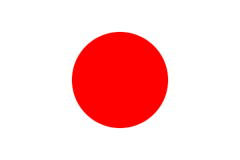 |
|
Years after
Japan's surrender Japan was allowed to create a Self Defense Force |
The nation, half the
population of the U.S. on about the real estate equal to the State of
California, has prided itself on not having one Japanese soldier
killed in combat since the end of World War II.
During the Gulf War, Japan refused to send military
troops and instead practiced "checkbook diplomacy," providing more
than $13 billion to support the war effort. The recent
decision to send Japanese troops to Iraq ends an era of "non-military"
involvement. The odds are high that a "combat death" will
occur, even though the Japanese military units in Iraq will be given
"supportive" positions, rather than front-line duty.
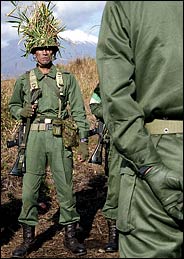 |
|
The price of
death for a Japanese Soldier in Iraq is nearly $1,000,000 |
Iraq
has become a guerrilla war. There are no front lines in
such a war, and a sniper or bomber can attack anywhere at any time.
There is a good chance the "price of death" will be paid and that the
nearly $1 million death benefit the Japanese government has placed on
the lives of its soldiers will be paid more than once.
Currently, American troops dominate the military
forces in Iraq, accounting for nearly 150,000. Other
nations have an additional 13,000 in Iraq. Some 400
Americans have been killed since the war started, 52 British and a
handful of others from various nations.
One of the reasons for the high monetary benefits
paid to the surviving families of any Japanese solider killed in Iraq
is an effort by the government to reverse history.
During World War II, the government was centered
at the feet of the Emperor. An imperial edict reminded all
the citizens as well as soldiers that their "duty" was to die for
their country. This drove Japanese soldiers to commit suicide
such as kamikaze attacks on or to refuse surrender and die to
the last man. Surrender created as stain of dishonor to
the state, to the individual and his family.

|
|
August 15,
1945 Emperor Hirohito's surrender speech: The Imperial Rescript |
The Imperial rescript
published throughout the land read: "Duty is heavier than a
mountain, while death is lighter than a feather."
Translated, it simply meant "Do Or Die!"
There has been a shift in modern post-war
times to that adage. It was expressed following the 1977
hijacking of a Japan Airlines plane when the government gave in to
hijacker demands to seek the release of 156 passengers.
The then prime minister said: "Human life is weightier than the
earth."
 |
|
The price of
death for an American soldier is $6,000 |
That weight
today, is measured in dollars, nearly $1,000,000 worth of them should
a Japanese soldier die in Iraq.
In contrast is the price of
death for Americans. The U.S. government pays a "death
gratuity" to surviving family members of $6,000, of which $3,000 is
taxable. The House of Representatives recently voted
413-0 to double the benefit to $12,000 and make it non-taxable,
however, the bill isn't law yet, and observers believe it will be lost
before it makes it through the legislative maze. Prior attempts
to increase the death benefit for American military personnel suffered
similar demise, especially when the government is slashing budgets and
cutting deep into the VA hospital facilities by closing major ones
such as the current proposal to shut down New York's Manhattan's VA
facility.
The decision by the Japanese to pay
$926,000 for any of its military personnel who die in Iraq is
startling in perspective. It suggests that nation values
the lives of its soldiers 154 times more than we do (our $6,000 death
benefit divided by theirs of $926,000).
Not that money is a measure of value
of human life. Human life is priceless. If
every nation had to pay $1,000,000 for everyone it killed in
war--civilians as well as military--wars might take on a slightly
different texture.
Vietnam would have cost the North
Vietnamese 58,000 American deaths x's $1,000,000, or $58 billion in
death benefits. The estimated 2 million deaths of
Vietnamese who died in that war would have cost the U.S.$2 trillion
dollars.
 |
|
The Japanese
once asked its people to die for "honor and duty" |
Life does have
value. The Japanese once asked its people to die for
nothing more than the "honor" and "duty" of their national
goal--ruling the world.
Americans have yet to send its troops
to war to "rule it." Historically, Americans die for
"free." They do not die to conquer lands. They
die to defend the rights of people and then retreat, to allow those
liberated countries to evolve as they best see fit, so long as that
evolution does not threaten future generations.
America's preemptive attack in Iraq
was done to protect the future of the world from tyranny and
oppression, to remove a despot who blatantly challenged the world's
security. Nations America once helped escape from the
thumbscrews of tyranny and oppression sat back and watched, argued and
spat upon America's unilateral actions to free Iraq, negating the fact
that America had once sent its young and brave to die for their
freedom.
In a way, the Japanese have made
their warriors priceless. The "price" put on their heads
of $1,000,000 may seem crass to some, but to a nation struggling to
muffle its historic thirst for aggression and nationalism, it is a
reminder to the world that those who give their lives for others are
worthy of more than $6,000, less than the cost of a reasonable
funeral.
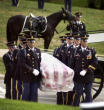 |
The National Funeral
Directors Association in 2001 estimates the average cost of a funeral
in New York City at $6,285. If you want to look at
the average funeral costs for your state, simply log on to the
following site and plug in your state.
Funeral Costs In Your State.
Each of us faces the question of "What is
our life worth?" when we engage the Beast of Terror in all his
diaphanous disguises. A child running into the street with
a car barreling drunkenly toward it offers the question.
Do we stand in shock and awe and watch the vehicle break and twist the
child's life, or do we risk our own to save the child?
When a ship is sinking do the men
shove the women and children out to make room for themselves, or do
they insure all the women and children are safe and secure before they
enter or chose not to so that the lives of others comes before theirs?
What is the price of selflessness?
Is it $6,000, half of which is
taxable? Is it $926,000? Is it $1,000,000,000?
Can it be measured?
A parent who hears the neighbors
beating their children and is frightened for his or her safety and
thus chooses not to enter the home and stop the abuse, what price does
that parent put on the safety of the abused child? What
price does that person on the "right of the abuser?"
The employer or boss who puts down
people and calls them "stupid" or treats them like slaves, and no one
among the ranks has the Courage or Conviction to stand up for the
rights of himself or herself, or the rights of the collective whole,
what price is put on such Complacency?
In so many ways, the war
in Iraq is a war against the "abuse of people" by others who feel they
have a "right" to rule over them as "they see fit," and that any
interference by the "outside" is an infringement on the sovereign
rights of the nation.
 |
Americans have willingly given their lives, or daily risk their lives,
to insure the abuse of others will not continue without a challenge.
That challenge has cost 400 American lives at a price of $6,000 each,
less taxes. That's a total of $2.4 million, of which the
government receives a portion of it back the following year in the
form of income tax.
It's hard for the world to say
America puts a high monetary price on the death of its warriors, but,
at the same time, it reminds the world that America is willing to die
for the "cause" and not the "money."
Japan has put a new value on
the death of its warriors. It relates the price of death
in monetary terms, a form of placating the families and salving the
"wounds of war."

|
|
America offers
its warriors for "free" |
America virtually offers its warriors for "free." The
death benefit is essentially non-existent since the price of a funeral
exceeds the amount of the benefit. In most cases, it will
cost the families of our fallen warriors to bury their dead.
But, in a way, that is good.
A true Sentinel of Vigilance is
not a mercenary. He or she doesn't engage the Beast of
Terror for glory or tribute, to conquer or rule. A true
Sentinel of Vigilance is like the man or woman who rushes out into the
street to knock the child out of harm's way and takes the front grill
of the Mack truck as his or her reward while others stand and gape and
hail the Sentinel.
"Did you see that? He or she
gave his or her life for that little child. What a hero!"
But the Sentinel didn't rush out into jaws of the
Beast of Terror to gain accolades. Politicians do that.
Politicians subscribe to the principle: "Find out where everyone
is going and then jump in front of them and pretend to be the leader."
Sentinels of Vigilance leap out before
anyone else. They are the first to step to the plate while
everyone else is hedging, humming, hawing, shuffling their feet,
turning their backs, whistling, averting their eyes to the shadow of
the Beast.
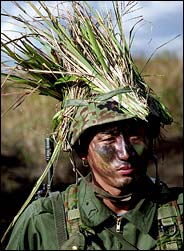 |
|
The citizens
of Japan now measure the death of their soldiers....... |
In Japan, a
soldier may elect to go to Iraq motivated by the fact if he dies his
family becomes a million-dollar beneficiary. The
citizens of Japan, however honorable and gracious their value of their
soldiers, now measure the death of their soldiers in monetary terms.
At what point will the price of the deaths of Japanese exceed the
budget allocated?
And, is $926,000 enough?
Some families may go to court to argue that government set too low a
price on the head of their son, and claim the under valuation of their
son's life.
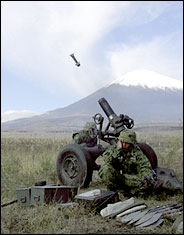 |
|
....in
monetary terms |
In the U.S., the price
of $6,000 is not even an issue. It means virtually
nothing, and, doesn't cover the cost of an average burial.
Further, the government asks for part of that money back, and at an
average tax rate of 22 percent, the government will ask for $660 back
from the $3,000 taxable portion of the $6,000 death benefit.
That makes the net death benefit for an American killed in Iraq
$5,340, about $1,000 less than the average burial cost in New York.
Ultimately, that means
Americans are willing to die for free plus $1,000
out-of-their-families' pockets. When our troops fall in
combat, it costs the citizens of the nation to bury them.
 |
|
America
seemingly employs the Spartan attitude |
This
is a Spartan attitude--dying for free, or, better stated, paying out
of your own pocket for the right to die.
But there is a value that far
exceeds money that Americans treasure more than any money can
purchase. That is pride and honor and dignity.
The children and grandchildren
of Americans who fought in wars can point to their grandfathers and
grandmothers and say: "They willingly gave their lives, or
risked their lives, for other people, for kids in other lands, and got
nothing in return for what they did. Some got spat upon
when they returned. Some got their veterans medical
benefits reduced or taken from them. Some live their lives with
great scars from the wars they fought--but they didn't get rich or
famous from war. They got nothing but the knowledge we,
their children, grandchildren and great grandchildren have that they
fought for our freedom, they fought for other people's freedom.
That's priceless."
I have no quarrel with Japan's
$926,000 death benefit. In a way, I have no quarrel with
the idea that American troops who die aren't paid the cost of their
funeral, or that the government taxes half the death benefit.
It certainly doesn't seem just that a family would have to dig into
its pocket to pay for a fallen American's death in defense of his or
her country, but then it is in alignment with the Great American
Dream.
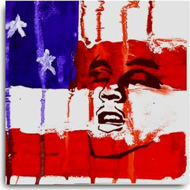 |
|
The Great
American Dream is not a selfish one |
That
Great American Dream is not a selfish one.
It is a dream that suggests
every child in every land can enjoy the benefits American children
enjoy, and that we, as a nation, are willing to dig into our pockets
and give our lives to offer that dream to others.
When one gets nothing for giving his
or her life so that others may be free, it suggests the highest order
of giving. When one gets $926,000 for such a death, it
suggests liberty and freedom has economic limits.
I like America's valuation of
death. It keeps it pure. It means we, as
Citizens of Vigilance and Parents of Vigilance and Grandparents of
Vigilance need to bow deeply to those who volunteer their lives.
They are doing it with no expectations of return, except, perhaps, the
belief down deep in the marrow of their being that what they are doing
is protecting their children and other children from the Jaws of the
Beast of Terror.
If there is a value in that, it far
exceeds any money that can ever be paid by anyone at anytime.
Nov.
18--America's
"Force
Of
Good"
Makes
State
Visit
To
England
©2001
-
2004,
VigilanceVoice.com,
All
rights
reserved
-
a
((HYYPE))
design

|
|
|